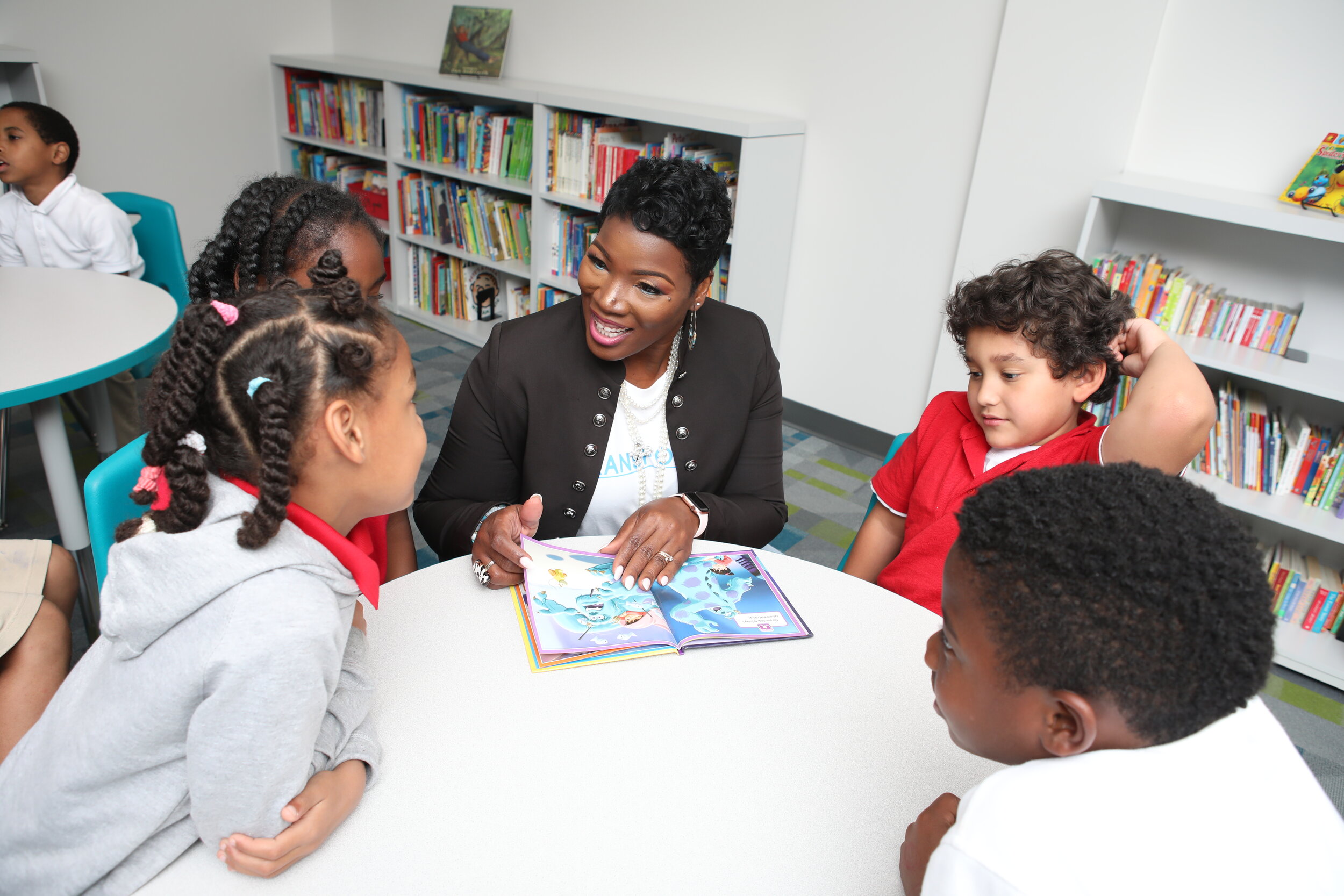Story by Katie Kelton. Photos courtesy of Interfaith Family Services.
Read Interfaith Family Services’ COVID-19 response and how Kimberly is caring for herself, her team, and the families they serve at the end of the article.
Today, in our own city, there is a well-worn path for homeless families. Fraught with obstacles and hindered by welfare, the path often begins with one or two parents earning a non-livable wage. Unable to afford housing, the family might receive transitional housing for immediate relief. After a family has a temporary roof over the head, the search begins for a more permanent and affordable solution, often leading to Section 8 housing. Section 8 housing limits a family’s assets, which means neither their car, savings, nor income (among other assets) can exceed a determined amount.
Once the family is settled into their Section 8 home, one of the parents might be offered a promotion at their job. This is great news – except that the promotion pay increase puts the family above the asset limit for Section 8. When the family begins to explore options for a new, non-Section 8 home, they realize none of the housing on the market fits their increased, but still tight, budget. Desperate, the parent turns down the promotion for fear of losing their current housing. In another three to five years of promotions, the family might have actually been able to afford a home on the market, but they won’t get there because the gap between non-livable and livable wage proves too wide.
This is just one of many realities for working families in Dallas. “So many families have the desire to [overcome poverty] but do not have the background or support system,” laments Kimberly Williams, Executive Director of Interfaith Family Services. Kimberly has made it her life’s mission to provide tools to fill the gaps and help families overcome poverty.

In her career, she spent nearly seven years at a HUD (Housing and Urban Development) initiative providing services to transition residents from welfare to work and nearly eight years delivering Girl Scouts programming to girls from low-income communities. She was tapped to lead Interfaith Family Services in 2011, and together with her talented team, has launched several successful capital campaigns, overseen the process of building new facilities, developed innovative programs, and improved outcomes for families.
Kimberly’s goal through Interfaith is simple yet complex: remove obstacles for families in poverty. What gaps exist between a working mother or father and their desire to earn a sustainable income, pay rent, and educate their children?
For families undergoing homelessness, Interfaith offers one-year-long transitional housing.
For families facing financial stress, Interfaith offers rent and utility assistance.
For families without access to child supervision, Interfaith offers high-quality, free childcare.
“Many low-income families lack the resources to overcome life’s ordinary obstacles. [These obstacles] set that person’s life in a certain trajectory, unless something comes in to interrupt that path,” Kimberly explains. That “something” is Interfaith.
After immediate needs have been met, the Interfaith team offers one-on-one career and financial coaching to parents and provides tutoring, play therapy, and group counseling to children. This holistic approach to poverty alleviation assures that each family is equipped with tools for success and no family is left behind.
For Kimberly, success looks like families overcoming obstacles to earn livable wages and achieve long-term stability, and a diverse and synergetic workplace at Interfaith.

First, families will begin to earn livable wages and exit the cycle of poverty. In the aforementioned example, the family may become homeless as a result of a parent’s job loss. This family moves into an Interfaith residence. The parent obtains work at a livable wage with the assistance of Interfaith’s Career Advancement Program and pays Interfaith 30% of net income as rent until they have enough savings to move into a more sustainable living situation. While the family is at Interfaith, the parents receive individualized coaching for career and financial success, and the children enjoy Interfaith’s opportunities for education, activities, play therapy, and artistic expression.
“Our clients have defied all of the stereotypes that people had about the poor,” Kimberly shares proudly. “When I first started, our average graduate wage was $9.40 an hour. I remember saying at the time, ‘We need to at least get to $12 an hour to be anywhere near livable.’ People told me, ‘That’s impossible for your demographic.’ And then we went from $12, to $15, and now we’re at $17…If we fill in those gaps and provide a helping hand, people will surprise you with their level of achievement.”
Second, Kimberly personally identifies with clients who defy the odds. She grew up in a working class family, raised by college-educated parents who worked hard to provide a better life for their children. However, “Many of the parents that Interfaith serves are like my parents in that they will do whatever it takes to build a better life for their children. As an African American woman, people assume that you come from a certain background and are going to approach life in a certain way,” Kimberly explains. “I refuse to fit into anybody’s stereotype.” The staff and community she leads are an embodiment of her vision, one that “reflects the diversity of thought and approach that women and people of color bring to the table.” In keeping with that vision, she sees Interfaith’s Family Empowerment Center as a space with holistic programs that promote financial, physical, and emotional health for all people in the community, regardless of income level or ethnicity.
In Kimberly’s words, “If we can appreciate and work with people from all backgrounds, the synergy that comes from that is going to be so much more dynamic than if we work separately.”
With Dallas having the third-worst child poverty rate in the nation, the need often seems larger than the community can handle. Leaders like Kimberly are tackling the problems of child poverty, homelessness, and unemployment one family at a time. Interfaith is paving a path that leads a different way forward than what homeless families have always known.
We also followed up with Kimberly to hear more about how her team at Interfaith is responding during the COIVD-19 crisis.
Can you share about how Interfaith is responding to COVID-19 in Dallas?
Over the last week, Interfaith has experienced eight times the normal calls for rent and utility assistance due to COVID-19 furloughed and laid-off workers. Many have been unable to file for unemployment due to the system being overloaded with inquiries. Their needs are urgent!
We remain open to provide essential services such as housing, childcare, and food pantry distribution. All other services are either being offered virtually or they have been temporarily suspended in lieu of city’s ordinances. Our childcare center remains open and is offering discounted tuition to first-responders and medical professionals in East Dallas who are in need of childcare.
We established a COVID-19 Affected Workers Fund to increase our capacity to provide rent and utility assistance to families in need. Additionally, we transitioned all of our financial coaching and career coaching to virtual sessions and we created a COVID-19 resource page, that will launch next week, on our website with more than 20 local employers who are currently hiring and information about companies that are offering deferment on payments in lieu of this crisis. We are also hosting a weekly conference call to provide updated employment and resource opportunities as well as encouragement in general for families that are struggling.
We have expanded our food distribution services to provide minimum contact, drive-through food distribution twice per month, instead of once per month. We fed 90 individuals in our first distribution.
What does volunteerism look like with Interfaith during COVID-19?
Most of our volunteer activities have been suspended. However, we are utilizing some volunteers to prepare bags of groceries for food distribution and prepare apartments for new families that are moving into our units. These activities can take place with limited interaction with staff and the public. Volunteers who provide financial coaching and career-coaching are doing so over the phone.
How are your families and children feeling right now?
Our families are nervous about maintaining or obtaining employment but they are stable. Our children are doing well, as we have expanded our afterschool program to offer day-time support for children who need access to our computer lab to complete assignments and parents who must go to work. We check temperatures three times a day and limit access to the children’s area to staff, though we have cameras in the childcare classrooms. So far, everyone has remained healthy and happy.
How are you taking care of yourself right now?
Right now, I am maintaining a morning routine of prayer, Bible study, and exercise. I have found comfort in these activities as the prayer and Bible study builds my faith in the midst of uncertainty and the exercise elevates stress. My team sends daily departmental reports related to client and team health and progress and I check in with my leadership team twice per week via a video conference call. The hardest thing has been creating a stopping point when working from home. But, I am working on it. This week, I use dinner time as the time when I go off-line for work for the remainder of the evening. On the weekends, we have family game night and cookouts. This simple flow has been comforting.
In what way (if any) is Interfaith participating in North Texas Giving Tuesday Now on May 5?
We are definitely participating in Giving Tuesday Now. Our focus will be doing so via social media and engaging our donors to share short videos on why they support Interfaith. We believe that this works best in the era of social distancing and we hope it will result, not only in increased giving, but increased knowledge regarding how we support the working poor.
If this story has inspired you to support the North Texas nonprofit community, visit our How to Support Nonprofits During Social Isolation page to learn how you can get involved!